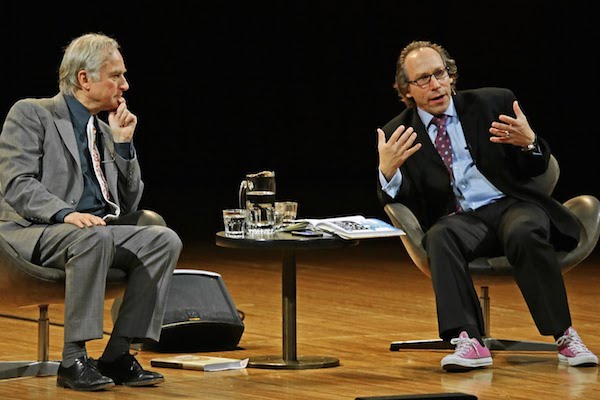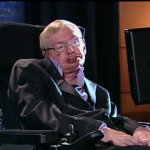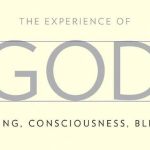The Dying of the Brights
by Matthew Becklo
Filed under New Atheists
“We have to make this planet as good as we possibly can and try to leave it a better place than we found it.”
The crowd, gathered to hear Richard Dawkins debate the Archbishop of Sydney, Cardinal George Pell, responds to the trite apothegm with unsurprising applause. But off-stage, after the cameras are turned off, the proverbial devil of the details rears his ugly head.
A weary Dawkins—one almost gets the sense that he’d rather not talk to anybody at all—kneels besides a disabled woman in a wheelchair, handing her a signed copy of his book and forcing a smile for the camera. The woman looks ecstatic to meet her hero; Dawkins seems to still be busy pummeling on Pell in some dusty corner of the same restless mind that gave rise to The God Delusion almost a decade ago.
We see this all play out in the 2013 homage to the New Atheism, "The Unbelievers", a sort of promotional travelogue which follows Dawkins and fellow atheist Lawrence Krauss around the globe to—like two real-life Hazel Moteses—spread the gospel of unbelief.
But Dawkins recently admitted something about people who, like this particular fan, suffer from a lifelong disability: it would have been better for them to have never been born.
Contemplating over Twitter what a woman pregnant with a Down Syndrome child ought to do, Dawkins said: “Abort it and try again. It would be immoral to bring it into the world if you have the choice.” The controversial and callous remark—certainly not the first from Dawkins—was not so much walked back as walked forward in his formal apology.
Dawkins is not the only New Atheist that has been mired in public controversy in recent years. From Krauss' cringe-worthy debate with a Muslim scholar to Sam Harris' recent comments about Islam on Bill Maher's show, bizarre, off-color public statements from the New Atheists—often made, or at least said to be made, because of an unflinching commitment to naturalism—are resulting in charges of brutality, misogyny, bigotry, and the same kinds of unflattering associations Dawkins had hoped to keep squarely on God’s head.
Of course, no mountain of personal controversies could discredit the claims of these self-styled “brights” or of atheists more generally. To suggest otherwise would be to engage in the very ad hominem attacks of which some of them are all too fond. But these headlines are, in their way, a visible symptom of what seems to be the diminishing traction and declining vitality of the entire New Atheist movement.
To put it in no uncertain terms: the New Atheism, if not already dead, is quickly dying.
This is first evident in a very literal way, in their fallen ranks. The “fifth horsemen” of the New Atheism, Victor Stenger, passed away a few months ago, but the loss of their leading horseman Christopher Hitchens in 2011 immediately comes to mind.
With Hitchens’ death, the New Atheism lost its scintillating, seductive flair. The wittiest, most likeable new atheist may not have converted as many as he would’ve liked, but certainly won the attention and admiration of many in the Christian community. In one of the first articles at Strange Notions, titled “Why I Loved to Listen to Christopher Hitchens,” Father Robert Barron confesses:
“I think I watched every Hitchens debate that I could find on YouTube; I subscribed to Vanity Fair largely because Hitchens was a regular contributor; I read every one of his books...No one wrote quite like Christopher Hitchens. Whether he was describing an uprising on the streets of Athens, or criticizing the formation of young men in the British boarding schools of the 1950s, or defending his support of the Iraq war, or begging people to let go of what he took to be their childish belief in God, Hitchens was unfailingly intelligent, perceptive, funny, sarcastic, and addictively readable.”
If Christopher Hitchens was the most stimulating New Atheist, the erudite Santa-lookalike Daniel Dennett was always the most scholarly. But, like Saint Nick himself, the philosopher has vacated the public eye so suddenly as to cast doubt on his very existence. Dennett has made no new enemies, inflamed no Twitter wars, and penned no blog screeds about the stupidity of faith. Instead—perhaps with an eye toward securing his legacy as a serious philosopher—he’s been sitting down with respected Christian thinker Alvin Plantinga for a civil, serious dialogue about science and religion.
And here, we see the root cause of the New Atheism’s decline: its lack of a sturdy philosophical foundation. Any organization can withstand its bad press if it’s grounded in something human, something wise, something timeless. But all along, scholars have grumbled that—unlike the writings of a Nietzsche, Sartre, or Russell—the New Atheism lacked intellectual depth and was doomed to self-destruction.
And they were right. Krauss looks like a farm team player brought up to revitalize a crumbling organization, trying (and failing) to recreate Hitch’s signature rhetorical jukes. Meanwhile, Dawkins is resorting to odd trick plays which never get off the ground. (His bizarre mutations of the mind art show comes to mind.) Nothing is meshing the way it used to, and the overcompensation on the part of the remaining leaders—and pushback from their rank and file—is telling.
Meanwhile, less vociferous unbelievers are gladly rushing in to fill that profitable cultural space. Neil deGrasse Tyson, for example, has rightly been accused of bungling the history of the Church with relation to science in his new "Cosmos" series—but he’s also quick to admit that he doesn’t have all the answers when it comes to God. “The only ‘ist’ I am is a scientist,” Tyson says in a Big Think interview. “What is my stance on religion, or spirituality, or God? I would say if I’d find a word that came closest, it would be agnostic...Atheists I know who proudly wear the badge are active atheists. They’re like in-your-face atheists, and they want to change policies, and they’re having debates. I don’t have the time, the interest, the energy to do any of that. I’m a scientist.”
Then there is Thomas Nagel, a renowned philosopher who—going beyond Tyson—is an avowed atheist. Nagel’s recent book Mind and Cosmos: Why the Materialist Neo-Darwinian Conception of Nature is Almost Certainly False drove fellow atheists up the wall, not only for its defection from the creed of naturalism, but for its alignment with the arguments of Alvin Plantinga—the same Christian enemy who has been sitting down with Dennett for tea.
Lastly, there’s physicist and atheist Sean Carroll who—going even beyond Nagel—is committed to the materialist conception of nature. Carroll penned an insightful piece recently titled “Physicists Should Stop Saying Silly Things About Philosophy.” While men like Dawkins, Krauss, and Stephen Hawking routinely dismiss philosophy as obfuscating gibberish that only serves to embolden the theologians, Carroll acknowledges that philosophy adds quite a lot to the modern scientific project. “The point, I take it, is to understand how nature works,” Carroll writes. “Part of that is knowing how to do calculations, but another part is asking deep questions about what it all means. That’s what got me interested in science, anyway...It’s a shame that so many physicists don’t see how good philosophy of science can contribute to this quest.”
This, happily, is the new tenor of the conversation. The apparently intramural rivalry between two fundamentalist spins on the world looks increasingly at odds with the problems and possibilities an open-minded majority face on the ground, and warriors from each side are deigning to say to the other, like Pound to Whitman:
I have detested you long enough...
Now is a time for carving.
We have one sap and one root –
Let there be commerce between us.
That’s not to say that passionate disagreement has ended—it hasn’t, and never will. But the tone and style of "The Unbelievers" seems a decade too late; the moment has passed. As celebrities like Bill Pullman and Cameron Diaz offer public support for this un-dynamic duo, and Krauss proudly holds up a tweet from Miley Cyrus with his picture and the quotation “forget Jesus,” the only real message that gets across is that intellectual fashions, like all fashions, come and go.
And as things continue to change where philosophical substance is concerned, the New Atheists and their readers will either change too, or fade away, raging against the dying of the brights.
Related Posts
Note: Our goal is to cultivate serious and respectful dialogue. While it's OK to disagree—even encouraged!—any snarky, offensive, or off-topic comments will be deleted. Before commenting please read the Commenting Rules and Tips. If you're having trouble commenting, read the Commenting Instructions.













